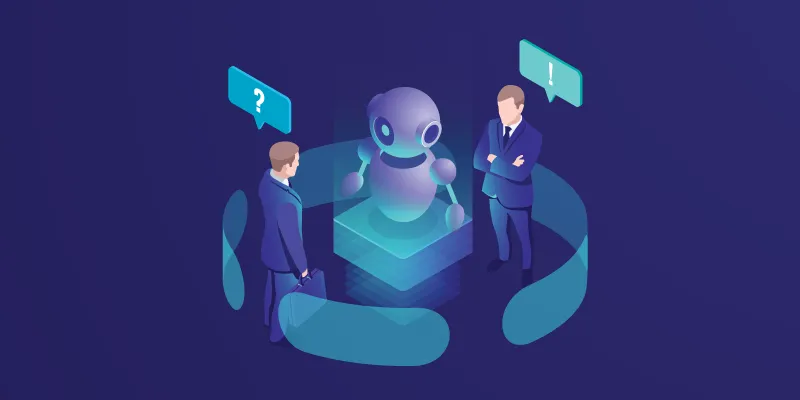Get your chatbots to work and make money
Monetising chatbots is not only a possibility today, it is also becoming a necessity. Companies need to understand what works for them and use it to their advantage.

A chatbot is the latest in the Artificial Intelligence (AI) tools, that is creating a buzz in corporate circles. Also known as talkbot, interactive agent or Artificial Conversational Entity, a chatbot is a computer program that can converse with humans using auditory or textual methods. This computer program is designed to simulate human conversations between a human and a machine and are these days being extensively utilised in customer service, order placement and customer acquisition, among other fields. Chatbots can reside on a chat app, a social media platform or even a website.
There are various types of chatbots. Some use state-of-the-art Natural Language Processing (NLP) systems while many others are simpler versions, which can help customers search for information in a database by using a keyword search and pull replies. There are various popular chatbots that exist in today’s market. Social media portals like Facebook have chatbots on brands’ pages where customers can search for items and place orders. Similarly, chatbots today can be accessed through virtual assistants like Amazons Alexa or Google Assistant to help people manage small tasks like playing a song.
The ultimate aim of any organisation seeking to use chatbots for its operations is to maximise profits. Chatbots can help an organisation effectively in leveraging sales, enhancing customer experience or streamlining customer service. However, organisations need to monetise chatbots as a business model to derive value. It is important for a business to strategically plan for chatbot monetisation.
Thanks to chatbot tools, many organisations are finding it easy to develop chatbots for their business. to monetize them effectively is a different task altogether. While some make money with their chatbots, these stories are few and far between. Chatbots require repeat clients and a stable influx of them to sustain their growth.
Some of the ways chatbots can be monetised are as follows –
Understanding customers
The first thing to consider while setting out to monetising your chatbot is to understand your customer’s psychology. You have to utilise it to your advantage. You need to deliver what the customer desires when he is clicking on a chat. Only then can a customer generate value for you. For a personal looking at a career counselling service, when he clicks on to a chatbot he needs a worthwhile and actionable information that will urge him to move further in the value chain and book an appointment with the career counselling company.
Utilising bots as a service (BaaS)
Bots are the most talked about technology in the present both in B2C and B2B environments. Bots can empower B2B businesses by handling difficult tasks, thereby increasing their productivity. It can replace the cloud and SaaS based business software that most B2B organisations employ. According to Forrester, the revenue from these software application services touched $33 billion in 2016. Their replacement by bots will spill most of this revenue into chatbots. Therefore, there is high potential for BaaS (bots as a service) to be a business model for B2B companies. As most of these companies are already familiar with the SaaS model, it will be a smooth transition into the bot version.
Putting chatbots as a landing page
A chatbot is not very different from a landing page. It is a call to action which urges the customers to delve deeper and talk to the company directly. It is like entering a website and searching for information but in an easier and interactive manner. Such a call to action is natural and apparent to the customer, which increases the chance of monetisation. It helps make the offering clear to the customer right at the beginning in a matter of seconds, and that is what is needed to get the customer’s interest piqued. Already, there are companies like Landbot.io, which transforms websites into conversational chatbot experiences.
There are many more strategies on monetising chatbots for businesses. One of the common ones is to utilise the chatbot on Facebook for pushing an organisation’s ecommerce agenda. For example, ChattyPeople, an AI-powered enterprise platform integrated Shopify into Facebook messenger, so customers can shop without even leaving Facebook. Companies can use chatbots for generating sales leads through their websites and collaborate with complementary brands by having their chatbot be available on the other brand’s resources thereby leveraging both the brands.
Monetising chatbots is not only a possibility today, it is also becoming a necessity. Companies need to understand what works for them and use it to their advantage. Arguably the technology is still in its infancy but is disruptive enough to catch the attention of major corporations. The ultimate aim of these corporations in deploying chatbots is and will be to size up the real opportunities in business.
Varying degrees of chatbot monetisation are on currently. However, merely deploying chatbots at points of contacts will not be enough. Organisations that proactively engage chatbots with customers, would be the ones that can turn them into true agents of change. Backed with relevant information support, a chatbot with a clearly articulated proposition can drive an organisation to the next level.
(Disclaimer: The views and opinions expressed in this article are those of the author and do not necessarily reflect the views of YourStory.)











